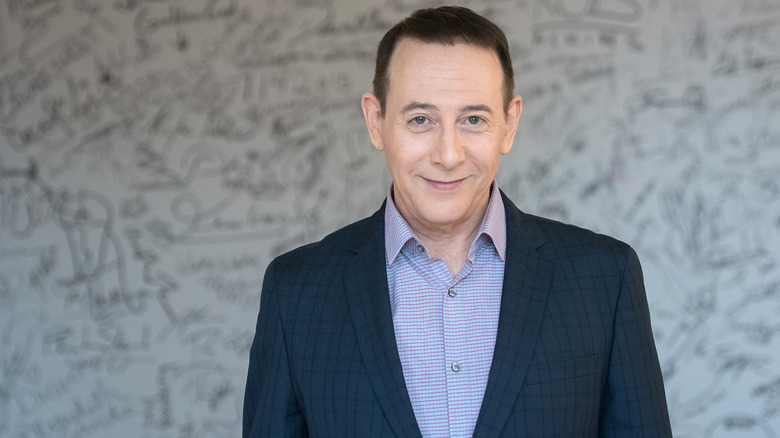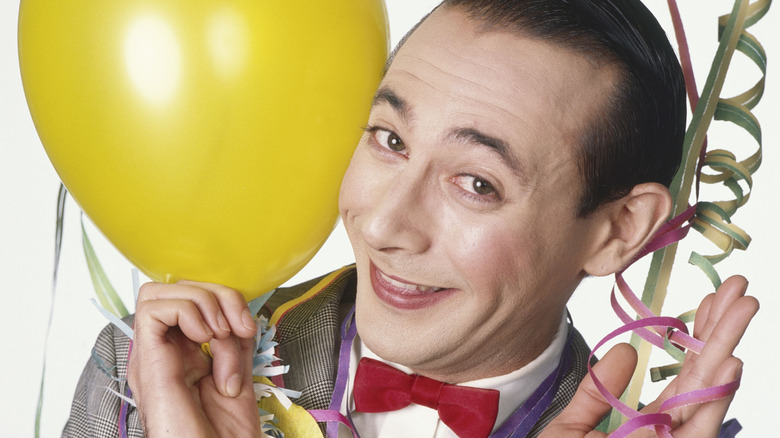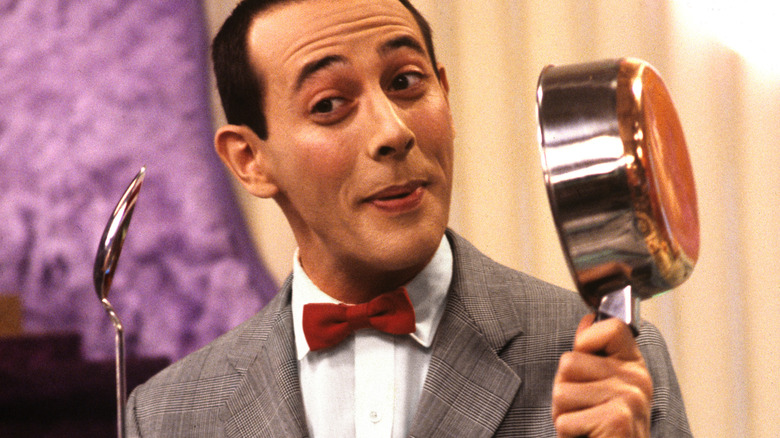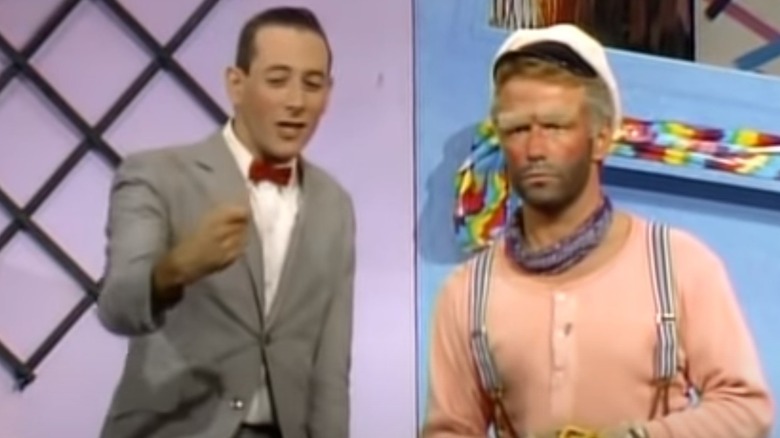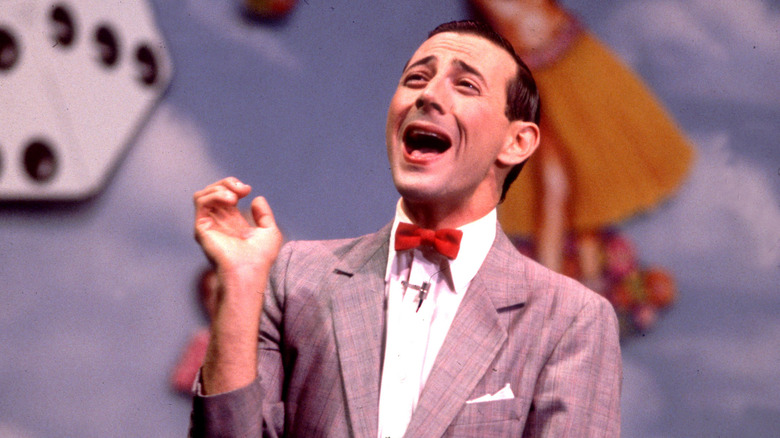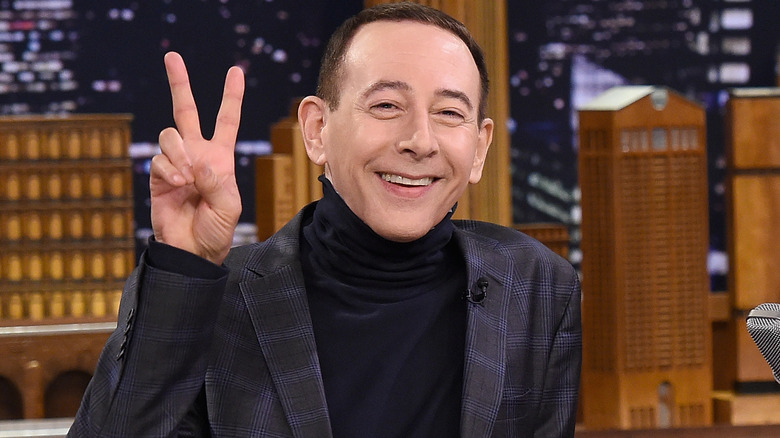The Tragic Real-Life Story Of Paul Reubens
One 1980s icon who seemed like he had a shot at being around forever was Pee-wee Herman. Even when the then 63-year-old Paul Reubens reprised the role in 2016 for "Pee-wee's Big Holiday," it looked like the perpetual man-child had stepped right out of his playhouse and onto the next adventure.
Paul Reubens inhabited his alter-ego so completely that for a long time, the world only knew Pee-wee Herman. That changed in 1991 in a high-profile way, when the man behind the bow tie was arrested in an adult theater and charged with indecent exposure. The arrest — and the very public fallout — devastated him, and although he maintained his innocence, it was lurid enough that he'd be associated with that forever going forward. In an interview with The New York Times, he addressed it briefly, along with his long-held regret over his decision to just disappear: "...it was stupid not to do anything," he said. "I never spoke out. I just went and hid ... if I had to do it over again, I would figure out a way to get out there, talk about it, take control of it."
Reubens had already walked away from playing Pee-wee when the news of his arrest broke, but the timing was terrible and overshadowed any plans he may have had for his career. What would he have done had that night in the X-rated theater not happened? It's impossible to tell, but it's not the only difficulty he's had to deal with.
His parents weren't allowed to associate with him... formally
Paul Reubens was incredibly close to his parents, and even after fame found him, he regularly took the time to visit them in his childhood home in Sarasota, Florida. He often lauded his father's commitment to his military career, and when he was diagnosed with cancer in the early 2000s, Reubens moved back home to help care for him.
That makes it unbelievably heartbreaking that both of his parents were pushed aside through his heyday as one of the most popular children's entertainers of the decade. A column for Sarasota Magazine shared that when Reubens hired manager Michael McLean, it was decided that Pee-wee Herman wasn't just a character, he was an entire person. Not only did Reubens not do interviews as himself, but fictionalized versions of his parents were created. Gone were Milton and Judy, replaced with Herman and Honey. That didn't entirely work out, so the idea of parents was overlooked altogether: In order to keep up the illusion that Pee-wee was a real person, his parents had strict guidelines to follow.
If they ever attended premieres, charity events, or functions, they were instructed not to identify themselves, not to associate with him in public, and definitely not to talk to the press. Judy wasn't allowed to set up interviews or speak on behalf of her son after his arrest, and when it came to finding her own voice as a celebrity mother? That was right out.
He wanted to be done with Pee-wee Herman a long time ago
When Paul Reubens was arrested in 1991, headlines shouted about how his career was over. Networks pulled his show from the air, and although that gave the appearance he'd been canceled, that wasn't actually the case: He'd already quit. His mother told Sarasota Magazine's "Mr. Chatterbox," Bob Plunket, that long before 1991, he was sick of Pee-wee, didn't want to play him anymore, and felt trapped in a role that had gotten way bigger than he intended. Pee-wee had initially been a stepping stone on the way to a serious acting career, but instead, she said, "Don't you think he feels a little silly, a grown man dressing up in that suit?"
Stephanie Moss was a longtime friend of Reubens, and she echoed the sentiment. "He loved Pee-wee," she told Plunket, adding: "But he wanted out." Those who knew him best described him as being exhausted by the facade, tired of having his life pushed aside in favor of Pee-wee's career, and who dreaded some inevitable requests: Meeting terminally ill children. He never turned them down, but he found it invariably, deeply painful.
Reubens felt beholden to Pee-wee, and when his 1991 arrest didn't just associate his name with lewd acts, it associated Pee-wee with them, too. In a 2004 interview with Stone Phillips (via NBC), Reubens talked about how heartbroken it made him: "I spent an awful long time 12 years ago thinking to myself, you know, this can't be my final thing."
An old friendship fell apart... then ended in violence
When Paul Reubens was first approached to put together the show that would turn into one of the biggest children's television programs of the 1980s, it wasn't an overnight process, and according to "Inside Pee-wee's Playhouse: The Untold, Unauthorized, and Unpredictable Story of a Pop Culture Phenomenon" by Caseen Gaines, it's entirely possible that it wouldn't have worked out the way that it did without the contributions of Phil Hartman. But, things ultimately went sideways.
On one hand, Hartman firmly believed that Reubens was making a huge mistake by turning his entire career into Pee-wee Herman. On the other hand, Hartman's successful attempts at furthering his own career left Reubens bitter and angry: Hartman was a Playhouse regular when he decided to move on to "SNL," and they didn't speak again for years.
Then, in 1998, Hartman was killed in a shocking series of events: After shooting and killing him in their California home, his wife, Brynn Omdahl, died by suicide. When Reubens sat down with Westword in 2016, he talked a bit about Hartman's lasting impact on him — and the friendship they treasured. He talked about how their friendship had formed instantly, how neither had really known what they were doing in the early days, and their goals in life. "We worked together on a lot of stuff... We were going to go out and rule the world. That didn't work out very good. I think about Phil all the time."
Yes, he knew some people think he's creepy
When it comes to Pee-wee Herman, there are two kinds of people: those who love him, and those who hate him. There's really no in-between, and even before his first arrest in 1991, that division was there. When Stone Phillips interviewed Paul Reubens in 2004, he asked him about a quote from Newsweek that referenced the fact that some people found Pee-wee Herman deeply unsettling. Reubens was aware of the fact, and it bothered him just as deeply.
"I don't know if I can view Pee-wee Herman as someone that would give you the willies," he said. "I mean, maybe that's because he's certainly part of me. Part of me is like Pee-wee Herman. Look at me, I'm getting defensive about [an article] that happened so many years ago, somebody said."
When Phillips observed that Pee-wee, on the other hand, was comfortable being himself and didn't care what other people thought, Reubens acknowledged the irony. "Yeah, I mean, I'm hating to admit that Pee-wee was healthier than me. But I think in some ways, he was."
His death came six years after he was diagnosed with cancer
When Paul Reubens passed away in 2023, it seemed to come out of nowhere. In his final message, though, posted to Instagram, he shared with fans that it wasn't precisely the case. "Please accept my apology for not going public with what I've been facing the last six years," he wrote. "I have always felt a huge amount of love and respect from my friends, fans, and supporters. I have loved you all so much and enjoyed making art for you."
His obituary in The New York Times confirmed that his death came six years after he was diagnosed with an undisclosed type of cancer. The piece lauded his contributions to the television landscape of the 1980s, and pointed out things that even longtime fans might not have been consciously aware of: He had insisted on an all-inclusive cast, for example. It also, of course, referenced his 1991 arrest for indecent exposure, proving just what a big deal that was.
Reubens has long maintained his innocence in the matter, but the fact that it's been mentioned so prominently — often alongside tributes to his selflessness, his kindness, and the impact he had on teaching countless kids that it's okay to be a little bit weird — shows how completely he was unable to shake the stigma.
